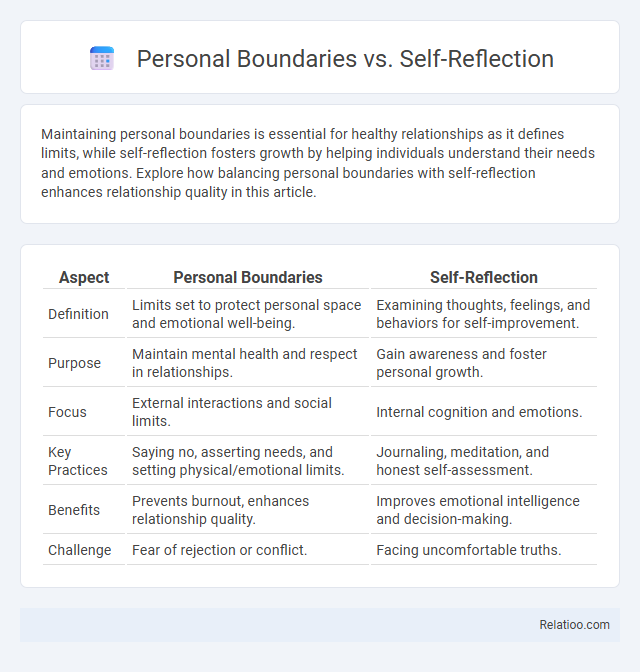Maintaining personal boundaries is essential for healthy relationships as it defines limits, while self-reflection fosters growth by helping individuals understand their needs and emotions. Explore how balancing personal boundaries with self-reflection enhances relationship quality in this article.
Table of Comparison
| Aspect | Personal Boundaries | Self-Reflection |
|---|---|---|
| Definition | Limits set to protect personal space and emotional well-being. | Examining thoughts, feelings, and behaviors for self-improvement. |
| Purpose | Maintain mental health and respect in relationships. | Gain awareness and foster personal growth. |
| Focus | External interactions and social limits. | Internal cognition and emotions. |
| Key Practices | Saying no, asserting needs, and setting physical/emotional limits. | Journaling, meditation, and honest self-assessment. |
| Benefits | Prevents burnout, enhances relationship quality. | Improves emotional intelligence and decision-making. |
| Challenge | Fear of rejection or conflict. | Facing uncomfortable truths. |
Understanding Personal Boundaries
Understanding personal boundaries involves recognizing and respecting limits that define individual comfort zones in relationships and interactions. Establishing clear boundaries safeguards emotional well-being and fosters healthy communication by preventing overextension and misunderstandings. Self-reflection and introspection enhance boundary awareness by encouraging evaluation of personal needs, values, and triggers that influence these limits.
The Essence of Self-Reflection
The essence of self-reflection lies in your ability to honestly examine your thoughts, feelings, and actions to foster personal growth and emotional awareness. Unlike personal boundaries, which protect your mental and physical space from external influences, self-reflection requires an inward focus that promotes deeper understanding and self-improvement. Introspection complements self-reflection by encouraging a thoughtful, deliberate analysis of your inner experiences to achieve clarity and self-awareness.
Why Boundaries Matter in Personal Growth
Establishing personal boundaries is crucial for your emotional well-being and self-respect, enabling clearer distinctions between your needs and others' expectations. Boundaries create a foundation for self-reflection by providing the mental space needed to evaluate your values, behaviors, and emotional responses without external interference. Introspection deepens this process, fostering personal growth through honest evaluation while respecting the limits set by your boundaries to maintain balance and self-care.
How Self-Reflection Influences Boundaries
Self-reflection enhances personal boundaries by increasing awareness of one's values, needs, and emotional limits, leading to healthier relationship dynamics. Through introspective practices, individuals identify what behaviors are acceptable, fostering clear and consistent boundary-setting. This self-awareness prevents boundary violations and promotes emotional resilience by aligning actions with core personal principles.
Setting Healthy Boundaries: Key Principles
Setting healthy boundaries involves recognizing personal limits to protect emotional well-being and ensuring respect in relationships. Self-reflection aids in identifying these boundaries by fostering awareness of one's values, needs, and feelings. Introspection deepens this understanding, enabling individuals to adjust limits effectively and maintain balanced interactions.
Common Challenges in Practicing Self-Reflection
Practicing self-reflection often faces common challenges such as overcoming cognitive biases, managing uncomfortable emotions, and avoiding superficial analysis of personal experiences. Your ability to establish personal boundaries can directly impact the depth of introspection by creating a safe mental space for honest evaluation. Developing consistent self-reflection habits requires intentional focus on recognizing these obstacles and cultivating emotional resilience.
The Interplay Between Boundaries and Self-Awareness
Personal boundaries define the limits that protect your emotional well-being, while self-reflection involves examining your thoughts and feelings to understand your values and needs. Introspection deepens this process by fostering self-awareness, enabling you to recognize when boundaries are being crossed or need adjustment. The interplay between boundaries and self-awareness strengthens your ability to maintain healthy relationships and promotes emotional resilience.
Signs of Weak Boundaries and Lack of Reflection
Signs of weak personal boundaries include difficulty saying no, feeling overwhelmed by others' demands, and frequent feelings of guilt or resentment. A lack of self-reflection manifests through repetitive mistakes, unawareness of personal triggers, and shallow emotional understanding. Insufficient introspection hinders emotional growth, resulting in poor decision-making and compromised mental well-being.
Strategies for Balancing Boundaries with Self-Insight
Establishing clear personal boundaries protects your emotional space while fostering healthy relationships, serving as a foundation for self-reflection and introspection. Techniques like regular journaling, mindful meditation, and setting specific limits on time and energy help balance external boundaries with internal self-awareness. Prioritizing both maintaining boundaries and engaging in honest self-assessment promotes emotional resilience and personal growth.
Cultivating Emotional Wellness Through Boundaries and Reflection
Cultivating emotional wellness requires understanding the critical balance between personal boundaries, self-reflection, and introspection. Personal boundaries protect your emotional space by defining limits in relationships, while self-reflection allows you to evaluate behaviors and emotions objectively. Introspection deepens self-awareness by exploring inner thoughts and feelings, empowering you to maintain mental clarity and emotional resilience.

Infographic: Personal Boundaries vs Self-Reflection
 relatioo.com
relatioo.com